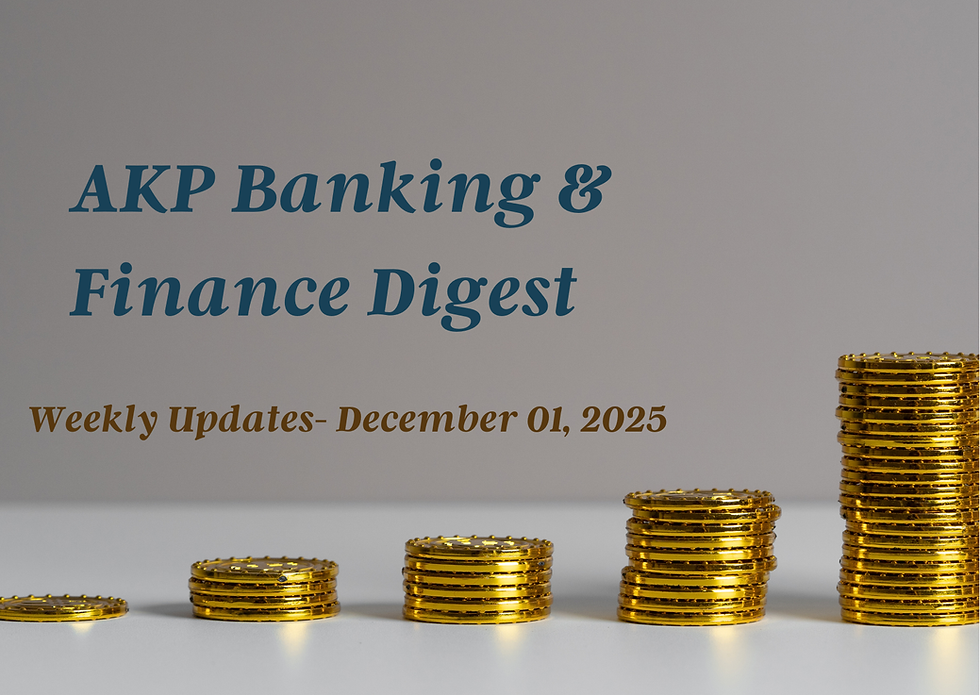AKP Banking & Finance Digest- November 25, 2024
- AK & Partners

- Nov 25, 2024
- 8 min read
1. Regulatory Updates
1.1. India
1.1.1. RBI hosts global south central bank policy conference
As part of its Ninetieth-anniversary celebrations, the Reserve Bank of India (“RBI”) hosted a High-Level Policy Conference in Mumbai on November 21-22, 2024, themed "Building Synergies." The event brought together delegates from 18 (eighteen) countries, including central bank governors and senior officials, to discuss inflation control, digital payments, reserve management, and regulatory challenges. RBI stressed the importance of resilient policies to tackle economic volatility. The seven-panel sessions emphasised experience-sharing and fostering partnerships among the Global South's central banks, aiming to strengthen their collective voice and enhance global policy influence for sustainable economic stability and growth in the region. RBI
1.1.2. RBI and MMA ink MoU for local currencies
RBI and Maldives Monetary Authority (“MMA”) signed a Memorandum of Understand (“MoU”) in Mumbai to promote the use of local currencies, the Indian Rupee (INR) and the Maldivian Rufiyaa (MVR), for cross-border transactions. This framework enables invoicing and settlement in domestic currencies, facilitating trade and reducing transaction costs. The initiative strengthens bilateral cooperation, enhances financial integration, and supports economic relations between India and Maldives, marking a significant step in fostering regional collaboration. RBI
1.1.3. RBI hosts directors’ conference in Mumbai
RBI held its second annual Conference of Directors on the Boards of Private Sector Banks on November 18, 2024, in Mumbai. With over 200 (two hundred) participants, the event focused on the theme ‘Transformative Governance through Sound Boards’. Sessions addressed governance frameworks, cybersecurity, Information Technology (IT) risks, and business challenges, culminating in a panel discussion by Independent Directors and an open house with RBI officials. RBI
1.1.4. RBI extends supersession of Abhyudaya board
RBI has extended the supersession of the Board of Directors of Abhyudaya Cooperative Bank Ltd., Mumbai, for an additional 12 (twelve) months, effective November 24, 2024. This action, under section 36AAA of the Banking Regulation Act, 1949 (as applicable to Co-operative Societies), follows the initial supersession on November 24, 2023, due to significant governance deficiencies within the bank. The RBI has deemed it necessary, in the public interest, to continue this oversight to address persistent concerns. RBI
1.1.5. RBI alerts on deepfake videos
RBI has warned the public about fraudulent deepfake videos on social media falsely showing RBI officials, including the Governor, endorsing investment schemes. RBI clarifies that it does not launch, support, or provide financial advice for such schemes. The public is strongly advised to avoid engaging with these deceptive videos and remain vigilant against such scams. RBI
1.1.6. Monetary Penalties
RBI imposes monetary penalties on the following financial institutions:
Name of the Financial Institution | Penalty Imposed | Reasons |
INR 1,50,000/- (Indian Rupees One Lakh Fifty Thousand only) | Contravention with certain directions issued by RBI on ‘Interest Rate on Deposits’ and ‘Know Your Customer (KYC)’. | |
INR 50,000/- (Indian Rupees Fifty Thousand only) | Non-compliance with certain directions issued by RBI on ‘Interest Rate on Deposits’. | |
INR 1,50,000/- (Indian Rupees One Lakh Fifty Thousand only) | Contravention of/non-adherence with certain directions issued by RBI on ‘Maintenance of Cash Reserve Ratio (CRR)’ and ‘Know Your Customer (KYC) norms’. | |
INR 4,10,000/- (Indian Rupees Four Lakh and Ten Thousand only) | Non-compliance with the directions issued by RBI on ‘Membership of Credit Information Companies (CICs) by Co-operative Banks’ and ‘Master Direction - Know Your Customer (KYC) Direction, 2016’. | |
INR 1,25,000/- (Indian Rupees One Lakh Twenty Five Thousand only) | Contravention of/non-adherence with certain directions issued by RBI on ‘Membership of Credit Information Companies (CICs) by Co-operative Banks’ and ‘Know Your Customer (KYC)’. | |
INR 3,00,000/- (Indian Rupees Three Lakh only) | Contravention of provisions of sections 20 and 26A read with section 56 of the Banking Regulation Act, 1949 (“BR Act”) and non-compliance with certain directions issued by RBI on ‘Know Your Customer (KYC) norms’. | |
INR 1,00,000/- (Indian Rupees One Lakh only) | Contravention of/non-adherence with certain directions issued by RBI on ‘Know Your Customer (KYC) norms’. | |
INR 1,25,000/- (Indian Rupees One Lakh Twenty Five Thousand only) | Non-compliance with certain directions issued by RBI on ‘Loans and Advances to directors, relatives and firms/concerns in which they are Interested’ and ‘Maintenance of Deposit Accounts – Primary (Urban) Co-operative Banks’. | |
INR 2,10,000/- (Indian Rupees Two Lakh and Ten Thousand only) | Contravention of provisions of sections 18 and 26A read with section 56 of BR Act and non-compliance with certain directions issued by RBI on ‘Membership of Credit Information Companies (CICs) by Co-operative Banks’, ‘Placement of Deposits with Other Banks by Primary (Urban) Co-operative Banks (UCBs)’ and ‘Know Your Customer (KYC) norms’. | |
INR 1,00,000/- (Indian Rupees One Lakh only) | Non-compliance with the directions issued by RBI on ‘Loans and Advances to directors, relatives and firms/concerns in which they are interested’ and ‘Know Your Customer (KYC) norms’. | |
INR 61,40,000/- (Indian Rupees Sixty-One Lakh and Forty Thousand only) | Non-compliance with certain directions issued by RBI on ‘Know Your Customer’. |
1.2. Bangladesh
1.2.1. Regulatory guidelines for JVCA with foreign partners
Bangladesh Bank issues updated guidelines for joint ventures, consortiums, and associations (“JVCA”) with foreign partners, detailing procedures for establishment, banking transactions, profit remittances, and financial reporting. The guidelines emphasise transparency in cross-border transactions, foreign currency management, and compliance with Bangladesh's foreign exchange regulations. JVCA entities must report their activities to Bangladesh Bank within 30 (thirty) days of obtaining necessary permissions and adhere to banking and tax protocols to ensure proper financial governance. Bangladesh Bank
1.3. Indonesia
1.3.1. BI holds rate and strengthens policy mix
Bank Indonesia (“BI”) maintains the BI Rate at 6 per cent (six per cent) during its November 2024 meeting, along with the Deposit Facility and Lending Facility rates at 5.25 per cent (five point two five per cent) and 6.75 per cent (six point seven five per cent), respectively. BI reinforces its policy mix by enhancing monetary instruments, stabilising the Rupiah, promoting Micro, Small, and Medium Enterprises (“MSMEs”), and deepening financial markets amid global uncertainties. Indonesia’s economic growth remains robust, with credit growth at 10.92 per cent (ten point nine two per cent) in October and financial system stability intact. Bank Indonesia
1.3.2. Indonesia's BOP surplus in Q3 2024
Indonesia's Balance of Payments (“BOP”) recorded a USD 5.9 billion (United States Dollars Five Billion Nine Hundred Million only) surplus in third quarter (“Q3”) 2024, improving from a USD 600 million (United States Dollar Six Hundred Million only) deficit in Q2. The surplus was driven by a narrower current account deficit of USD 2.2 billion (United States Dollar Two Billion and Two Hundred Million only) and a higher capital and financial account surplus of USD 6.6 billion (United States Dollar Six Billion and Six Hundred Million only). Bank Indonesia
2. Trends
2.1. Revolut India to disrupt forex market
Revolut India, having received approval from the Indian central bank, plans to launch its services in the second half of 2025. The fintech giant aims to offer a digital wallet for forex and domestic transactions, targeting the competitive forex space dominated by banks. With over 45 (forty-five) million global customers, Revolut’s entry into India aims to tap into the growing Unified Payment Interface (“UPI”) payments infrastructure despite the challenges of the local market. Finance Magnates
2.2. India explores cross-border payment links
India is in talks with countries including the United Arab Emirates (UAE) to establish new cross-border payment linkages, according to RBI Deputy Governor T. Rabi Sankar. These efforts build on existing ties with Sri Lanka, Bhutan, and Nepal and are part of broader financial integration initiatives in Southeast Asia. The RBI is also exploring the role of central bank digital currencies (CBDCs) in enhancing cost-effective trade settlements and remittances. Fintech Singapore
3. Sector Overview
3.1. Fintech drives growth in India’s lending market
India's fintech market has seen exponential growth in digital lending, with loan disbursals rising at a 46 per cent (forty-six per cent) Compound Annual Growth Rate (CAGR) from Fiscal Year (“FY”) 2021 to FY24, reaching INR 1.46 lakh crore (Indian Rupees One Lakh Forty-Six Thousand Crore only). Fintechs have streamlined processes with Artificial Intelligence (AI), blockchain, and Application Programming Interface (“API”)-driven solutions, enabling faster loan approvals and enhanced customer experiences. Digital lending now constitutes 10 per cent (ten per cent) of Non-Banking Financial Company (NBFC) and 2 per cent (two per cent) of bank loans. PwC India
4. Business Updates
4.1. Rio.money launches UPI app and credit card
Rio.money has launched a UPI app enabling seamless credit access for UPI payments. In partnership with YES BANK and National Payments Corporation of India (NPCI), the company also introduced the YES BANK Rio RuPay Credit Card, offering exclusive rewards, no fees, and credit limits up to INR 5 lakh (Indian Rupees Five Lakh only). Targeting Tier 2 (two) and 3 (three) cities, this initiative aims to revolutionise credit access in India, with plans to reach 100 (one hundred) million users in five years. IBS Intelligence
4.2. CredFlow raises INR 31 crore for growth
CredFlow, a cash flow management Software as a Service (SaaS) platform for Small and Medium Enterprises (“SMEs”), has raised INR 31.2 crore (Indian Rupees Thirty-One Crore Twenty Lakh only) in its Pre-Series B round, co-led by Inflexor Ventures and a Singapore-based family office. The funds will be used to scale its financial and lending services, and enhance its tech stack. The startup, which acquired Y Combinator-backed TechBiz in 2023, aims to expand its offerings for SMEs. Inc42
4.3. Phi Commerce introduces UPI switch for enterprises
Phi Commerce, a fintech offering omnichannel payment solutions, has received National Payments Corporation of India (“NPCI”) certification to provide UPI Switch for enterprise customers. This feature enables faster onboarding, reduces turnaround time, and supports high transaction volumes. UPI Switch offers real-time fraud monitoring, multi-server traffic distribution, and API-based integrations, ensuring reliability and efficiency. Supporting NPCI features like UPI Auto Pay and instant refunds, it helps enterprises lower operating costs and enhance customer experiences through seamless payment processes across Business-to-Business (B2B) and Business-to-Consumer (B2C) platforms. The Financial Express
4.4. Groww faces 30 per cent valuation cut after reverse flip
Fintech unicorn Groww has completed its reverse flip, relocating its domicile from the United States to India. Following this move, Groww's fair market value has been slashed to under USD 2 billion (United States Dollar Two Billion only), reflecting a 30 per cent (thirty per cent) decrease from its USD 3 billion (United States Dollar Three Billion only) valuation in 2021. The company paid USD 160 million (United States Dollar one Hundred and Sixty Million only) in taxes to the US government based on this new valuation. The Economic Times
-
Disclaimer
The note is prepared for knowledge dissemination and does not constitute legal, financial or commercial advice. AK & Partners or its associates are not responsible for any action taken based on its contents.
For further queries or details, you may contact:
Mr Anuroop Omkar
Partner, AK & Partners





Comments